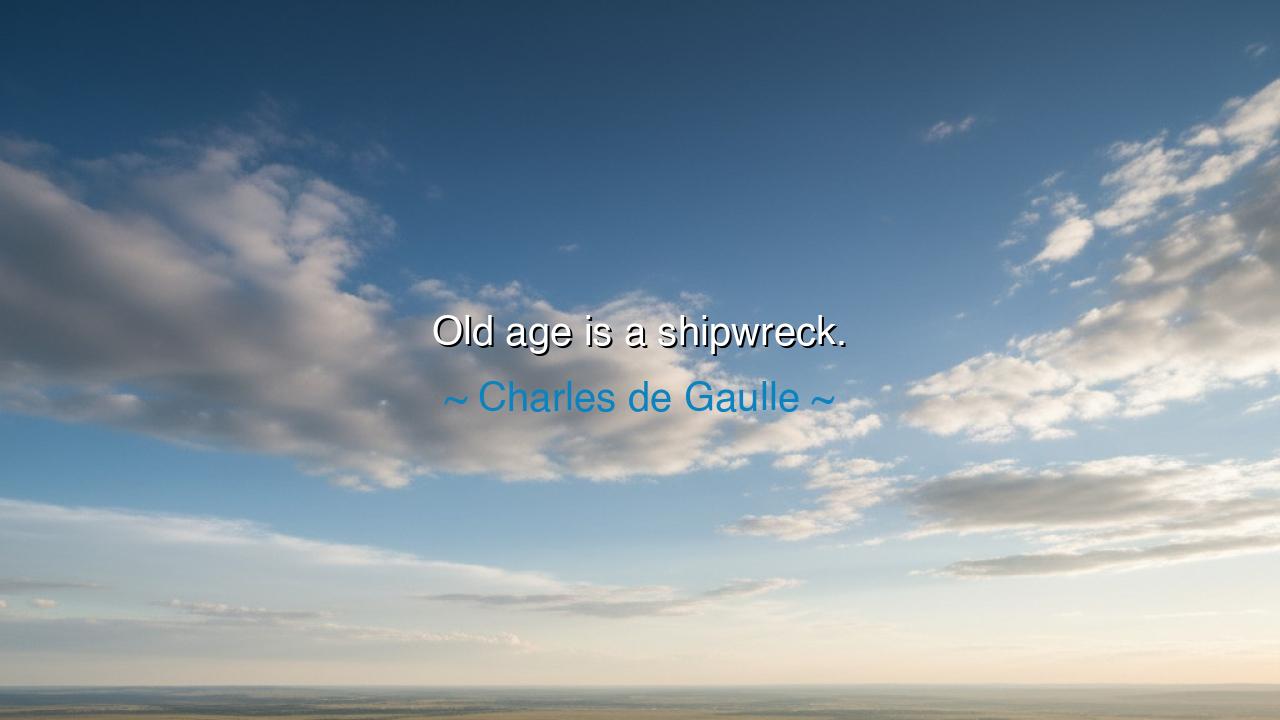
Old age is a shipwreck.






"Old age is a shipwreck." - Charles de Gaulle. In this stark and evocative statement, de Gaulle presents old age not as a natural progression, but as a catastrophic event, a final disaster to which we are all inevitably drawn. The shipwreck metaphor suggests that old age, like a great storm at sea, strips us of our vitality, our strength, and our power, leaving us broken and adrift in a world that seems to move forward without us. The image of a shipwreck is not one of peaceful decay but of violent upheaval, where everything we once were—our health, our abilities, our sense of purpose—are shattered and cast into the unforgiving sea of time.
Consider the life of Winston Churchill, who, in his later years, continued to fight for the ideals he had championed throughout his life. Though his body weakened and his mind began to show signs of age, Churchill’s spirit remained unbroken. Yet, even he, with all his greatness, could not escape the shipwreck of age. As he struggled to keep pace with the changing world, he was forced to confront the infirmities of his body and the relentless march of time. In this way, Churchill’s life exemplifies the conflict between the vitality of youth and the inevitable decline of old age. His ship, so steadfast and strong in the early years of his leadership, was ultimately left stranded and broken by the storms of age.
But what de Gaulle calls a shipwreck, others might view as a transition or a challenge. The shipwreck metaphor suggests loss, but also the possibility of resilience. While the body may weaken, the spirit can find ways to rebuild, to adapt, and to survive. In old age, we are often forced to leave behind the things we once knew and navigate the rough seas of our physical limitations, yet it is also a time when we must rediscover our purpose and inner strength. It is through this struggle that the greatest wisdom and resilience often emerge. The lesson of the shipwreck is not simply about being broken, but about learning how to rebuild ourselves from the pieces left behind.
Take, for example, the story of Mahatma Gandhi, who, even in his later years, continued to fight for the cause of freedom and justice. Though his body grew frail and his health deteriorated, Gandhi’s spirit remained unyielding. He did not see his old age as a shipwreck, but as a final opportunity to guide his people to independence. His life shows us that while old age may strip away our physical power, it does not necessarily destroy our ability to make an impact. The wisdom and determination Gandhi carried with him into his later years helped him steer his people toward freedom, proving that the human spirit can endure even after the body begins to fail.
De Gaulle’s words also speak to the emotional toll that old age can take on the soul. As we age, we often experience the loss of loved ones, the diminishment of our social roles, and the withdrawal of our physical strength. These are the wreckage that comes with growing old—the death of our former selves. Yet, it is also in these moments of loss that we are often forced to confront the deepest parts of who we are. The challenges of old age demand that we grow stronger, that we adapt, and that we find meaning even in the face of physical decline. Just as a shipwrecked sailor must learn to survive and find a way to shore, so too must we learn to navigate the trials of age.
The true lesson of de Gaulle’s words, then, is not that old age is something to be feared or avoided, but that it is something to be understood and embraced. The shipwreck is not the end, but the beginning of a new journey. It is in old age that we are given the opportunity to reflect, to share our wisdom, and to leave behind a legacy. We may feel broken at times, but we are not beyond repair. Resilience and wisdom are often forged in the fires of hardship, and the challenges of aging are no different.
Thus, the practical lesson we must take from de Gaulle’s words is to approach old age with courage and grace. Do not fear the shipwreck, for in it lies the potential for renewal. As the body may crumble, let the spirit rise. Like the great leaders and thinkers who have walked before us, we must learn to adapt, to find new purpose, and to navigate the storms of life with resilience. Let your old age be marked not by sorrow, but by strength and wisdom, for in the wreckage of the past, there is always the possibility of a new beginning.






AAdministratorAdministrator
Welcome, honored guests. Please leave a comment, we will respond soon